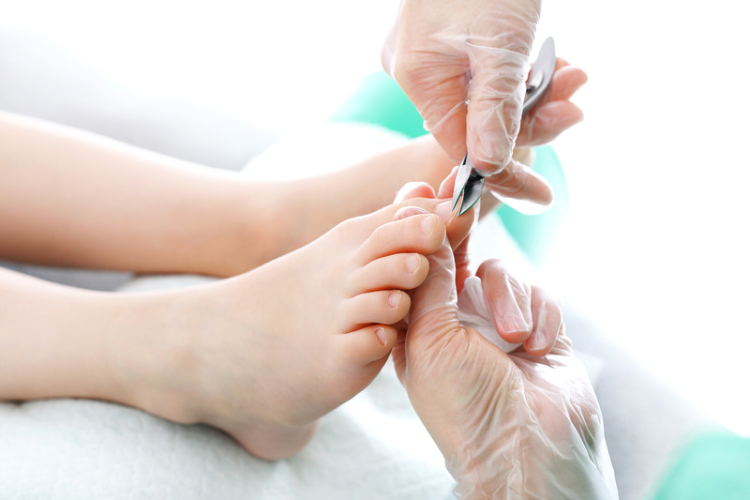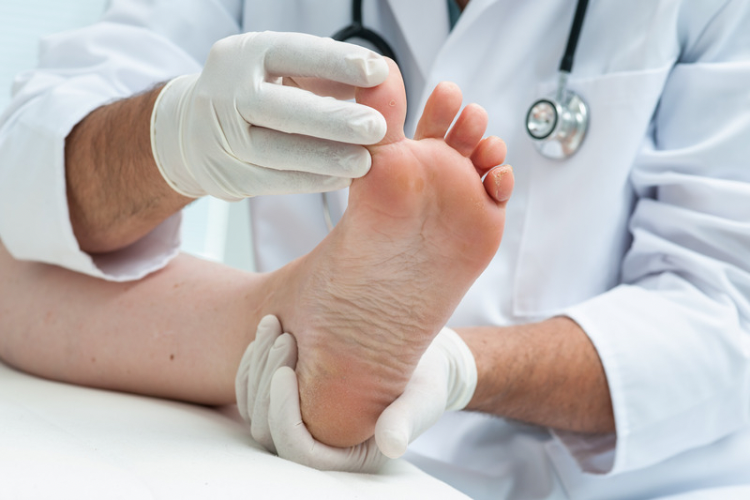Fungal Nail Treatment Birmingham - The Lacuna Method
SIMPLE EFFECTIVE TREATMENT FOR FUNGAL NAILS.
How do I know if I have Fungal Nails?
You may have noticed changes in the texture, quality and colour of your toenails. Sometimes it is noticed after removing nail varnish or gels. First signs are often a yellowing or brown discolouration, nails may become thick, crumbly or brittle. Nails can become distorted, change shape and may lift from the nail bed losing their healthy shine.
How can the Lacuna fungal nail treatment help me?
Fungal Nail infection (Onychomycosis) is the most difficult of the superficial fungal infections to treat, as most topical agents are ineffective at penetrating the nail plate to reach the active infection on the nail bed (the skin under the nail).
By making micro holes in the nail plate with the innovative and specially designed micro burrs, your Podiatrist can enable you to apply an anti-fungal agent such as Lamisil spray directly to the infected nail bed, this helps to cure the nail infection faster than other forms of fungal nail treatment. Which will spread under the nail as you walk. With daily application of the anti-fungal agents, the fungus is stopped from spreading and the damaged nail grows out. As the nail is dead you cannot feel the holes being made.
The lacuna method is one of the best treatment methods for fungal nails as opposed to regular fungal nail treatment because the bore holes created using the lacuna method allow the fungal nail solution to penetrate the infected part of the nail and combat the infection.
Fungal Nail Infections
Fungal nail infections are caused by the dermatophyte fungi that naturally live on our skin. When trauma to the nail occurs i.e micro trauma from footwear, the fungi can invade under the nail plate. In the moist warm environment of Socks and Shoes the fungi thrive, causing damage, thickening and discolouration to the nail. This most commonly affects the big toes; however, all nails are vulnerable. Treatment is notoriously difficult as the nail plate acts as a barrier, shielding the infected area.
What is the Lacuna Fungal Nail Treatment Method™?
The Lacuna Method is a treatment for fungal nails which involves drilling multiple micro holes through the nail plate, this allows an antifungal solution such as Lamisil ® AT 1% Spray to be transported to the area of infection (the nail bed) directly. We will advise you on the frequency and duration of the application of the spray. Pressure applied to the toe when walking will aid to spread the medication under the nail. The treatment can show signs of improvement quickly however, it can take upto 18 months to clear the infection from your nails.
As the nail is ‘dead’ the holes remain and will grow out naturally. Review appointments are recommended on average every 6 weeks; however, this may vary and we will advise you of this. This is a relatively new treatment and although short-term studies have been very encouraging, no treatment can be guaranteed to be 100% successful.
Fungal Nail treatment costs in Birmingham
Your Podiatrist will advise you on which treatment will best help to treat your problem. Often a course of treatment is best:
· 1 nail £240. 4 treatments 6 weeks apart. To include Lamisil spray and a shoe Klenz of a pair of shoes during your appointment. (The Klenz unit destroys all microbes in your footwear and can last for 6 weeks)
· Multiple nails (2 or more) £350. 4 treatments 6 weeks apart. To include Lamisil spray and a shoe Klenz of a pair of shoes during your appointment. (The Klenz unit destroys all microbes in your footwear and can last for 6 weeks)
If performed as part of a one off appointment (Lamisil spray and shoe klenz sold seperately)
· £60 for one toenail
· £110 for 2
· £150 for 3 or more
· If it is your 1st appointment with us there is an additional £10 for your initial assessment.
Please note not everyone is suitable for this treatment. When booking your first appointment we would need to do an assessment of your general medical condition and a vascular / neurological assessment. Therefore your appointment would be longer initially and an extra charge of £10 would apply.
-
Fungal nail infections most often occur as a result of the fungi that cause athletes foot, penetrating the nails and then further spreading its infection. While often living harmlessly on the skin, they can easily multiply and cause a whole host of problems for your feet, toes and toenails. Fungal infections are also highly contagious, so keeping your feet covered and protected is essential when moving in public spaces like gyms and swimming pools.
There are a couple of other things that could make you more likely to contract a fungal nail infection, these are:
Poor hygiene on your feet
Wearing bad quality shoes that aren't breathable
Walking barefoot in public spaces
Having already damaged nails or a weakened immune system
-
Prevention is the best thing that can be done for fungal nails as they can be stubborn and tricky to remove. To prevent fungal nails you should:
Regularly wash and thoroughly dry your feet using a clean towel, ensuring to get between the toes
Wear well-fitting and breathable shoes and socks. Moisture-wicking socks are the best as they help to draw excess moisture away from your feet.
Ensure your toenails are cut correctly (not curved) and are kept from becoming too long.
Regularly clean and decontaminate your footwear using an antifungal spray and allow them to dry fully between uses.
-
Unfortunately, fungal nail treatment is not a speedy process. The lacuna method, the fungal nail treatment method that we use here at our podiatry clinic in Birmingham, will take at least four sessions, six weeks apart from one another. While you will begin to see results of the fungal infection showing signs of being removed within the first month or so, you should continue the treatment for some time to ensure the fungal infection has been fully removed.
-
With the Lacuna method of fungal nail treatment, you can still continue with your day-to-day activities as you usually would. The treatment is performed using a local anaesthetic, so it will be entirely pain-free while being undertaken; you may experience some slight discomfort following, but usually, it's not too bad.
Fungal Nail Treatment FAQ’s
Contact us.
329 Chester Road, Castle Bromwich
Birmingham B36 0JG







